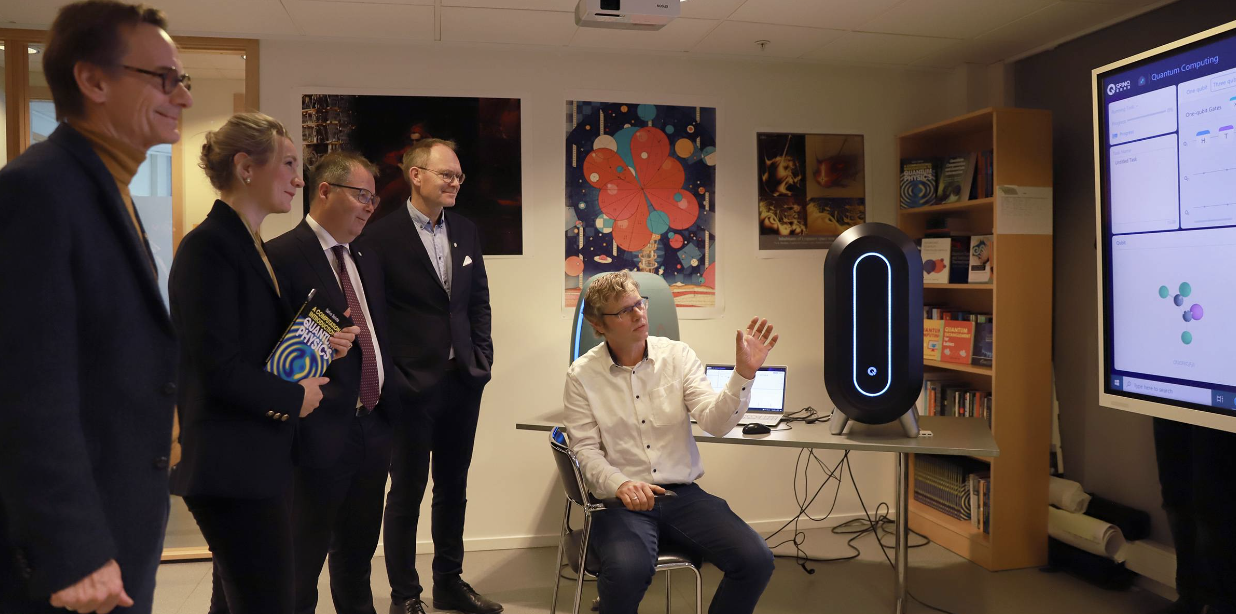Norway’s $6.6 Million Quantum Technology Initiative Launched at OsloMet

Insider Brief
- The Norwegian government has committed NOK 70 million annually (around $6.6 million USD) to support quantum technology research, aiming to bolster the country’s innovation and security infrastructure.
- OsloMet, home to a leading quantum research hub, will play a central role in the initiative, focusing on advancing quantum computing and preparing future experts in the field
- .Quantum computers, capable of breaking current encryption methods, present both opportunities and challenges, including potential security risks and democratic concerns.
- Image: Professor Sølve Selstø has recently published a practical introductory book in quantum physics and is central to the academic community on quantum technology at OsloMet. He explained to the guests the basic principle of how quantum computers work compared to ordinary computers. (Marit Christiansen / OsloMet)
PRESS RELEASE — The Minister of Digitalisation and Public Governance, Karianne Tung; the Minster of Defense Bjørn Arild Gram and the Minister of Research and Higher Education Oddmund Hoel have agreed to set aside NOK 70 million annually in the Norwegian state budget for research into quantum technology.
The ministers visited OsloMet’s Quantum Hub to launch the initiative, which they described as highly anticipated.
“Finally we are gathering our forces. The data processing of the future is already here, with associated opportunities and risks that increase sharply, so we need a real boost in this area now,” said Minister of Research and Higher Education Oddmund Hoel.
The Minister of Digitalisation and Public Governance pointed out that quantum technology is a tool that can contribute to meeting several major societal challenges, for example linked to climate and the need for new medicines.
“We have already worked for several years with this technology in various professional environments in the country, such as here at OsloMet. Now we are gearing up for a common national, and not least Nordic, technological leap forward for the good of society,” explained Karianne Tung, who hopes the money will quickly get to work.
The Minister of Defense emphasized the need to increase expertise in quantum technology, which can be used to crack encryption.
“We depend on being able to communicate securely. Ensuring that our security systems and cryptographic solutions are also secure now as quantum technology fully emerges is very important,” said Gram.
OsloMet’s professional environment is ready
OsloMet’s Rector Christen Krogh is pleased with the initiative, and emphasizes that the university takes its share of responsibility for increasing knowledge in quantum technology.
“The question is no longer if, but when quantum technology will be mature enough to be able to make calculations that are impossible today.”
“We already have one of the leading professional communities in the country in this area and will contribute to both research and educate enough people with expertise to be able to both utilize the potential of the technology, and also secure ourselves against the negative effects,” says Krogh.
OsloMet’s Quantum Hub is a leading national professional environment within quantum data processing and mathematical modelling. Professor Sølve Selstø from the Quantum Hub demonstrated to the three ministers how the university’s quantum computers can perform calculations.
“Quantum computers have a much faster search algorithm and can process large amounts of information at once. For example, it has the ability to find factors in large numbers, which is what is needed to crack much of today’s encryption,” explained Selstø.
The professor made the ministers aware of another issue to be aware of.
“Quantum technology brings with it a democratic challenge, there are many people in society who do not know anything about it. At OsloMet, we have started to include the topic in teaching in relevant courses,” he says.
